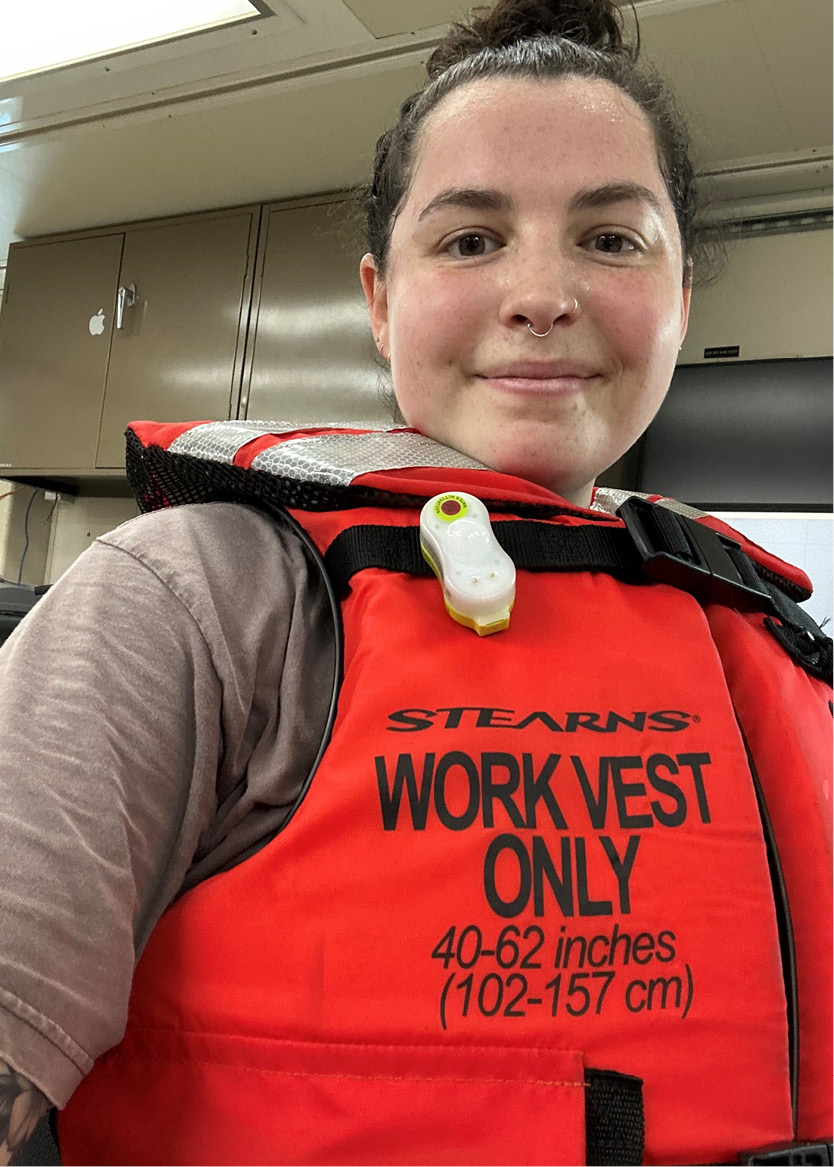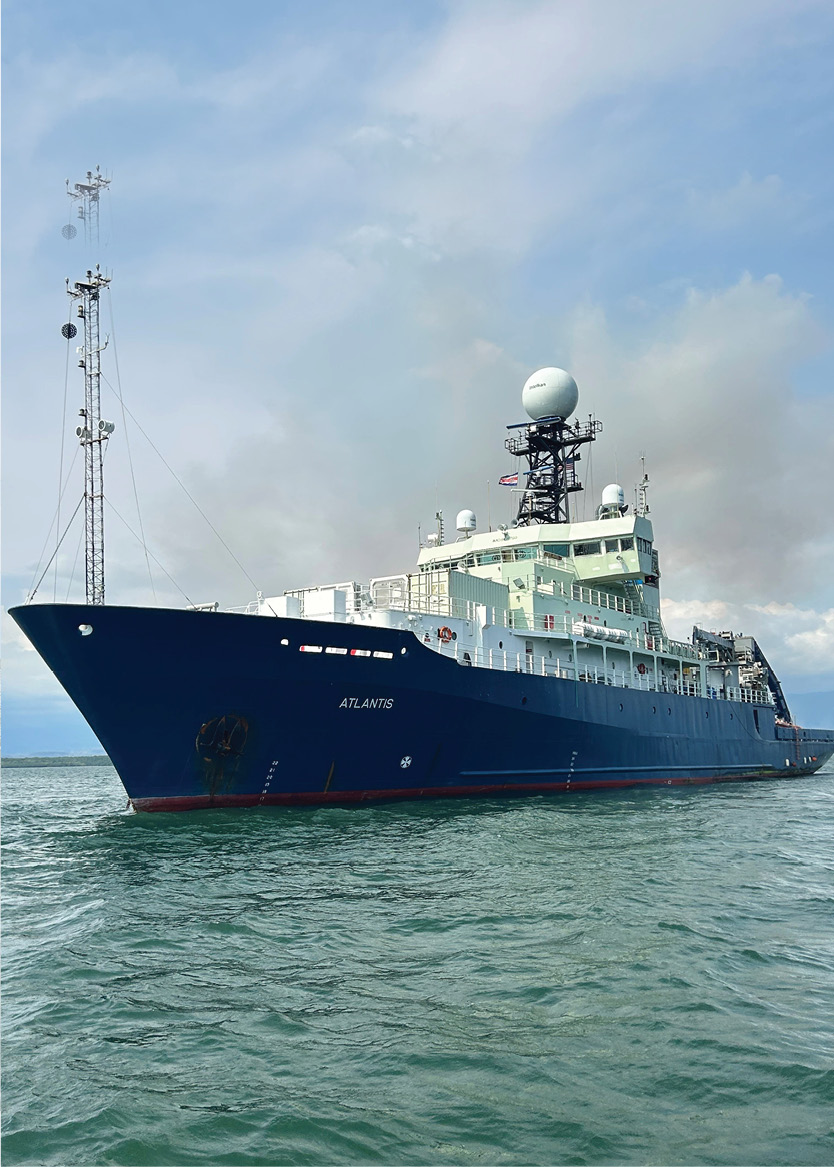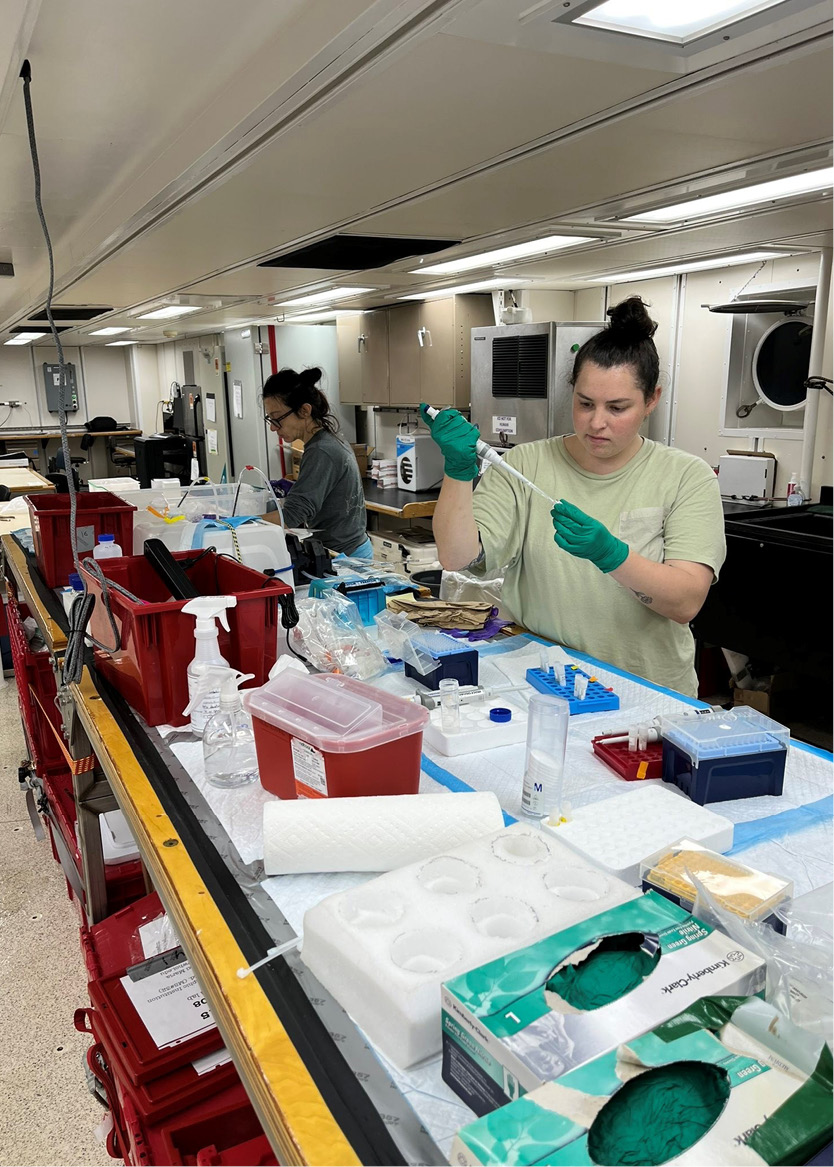May 18, 2023
Graduate Represents Molloy on Research Cruise
 A lifelong devotion to the environment and sustainable living as well as a strong connection with a Molloy University faculty member led recent alumnus Bailey Rosen aboard a six-week research cruise in the Pacific Ocean this year.
A lifelong devotion to the environment and sustainable living as well as a strong connection with a Molloy University faculty member led recent alumnus Bailey Rosen aboard a six-week research cruise in the Pacific Ocean this year.
During the Micro Pro cruise, short for Microbial Processes, Bailey worked closely with lead scientist Dr. Maria Pachiadaki of the Woods Hole Oceanographic Institute by serving “as an extra pair of hands.” She also was the lead writer for the ship’s blog on WordPress, which put her in close touch with an international crew of scientists and researchers.
Traveling to a research site off the coast of Costa Rica and two in Mexico’s waters during the Feb. 7 to March 18 cruise was a heady experience for the 23-year-old, who graduated from Molloy in May 2022 with a bachelor’s degree in earth and environmental studies.
Asked to describe her biggest scientific lesson, Bailey responded that the importance of networking came home to her at every turn in the Pacific. “If there is a question you want to know, there are so many people who want to know too and will help you to figure it out,” she said.
She was Molloy’s lone representative on Micro Pro, a National Science Foundation-sponsored research project, which was delayed from summer 2020 due to the pandemic. Elizabeth Suter, Ph.D., an assistant professor of environmental science in Molloy’s Department of Biology, Chemistry and Environmental Studies (BCES), originally planned to be involved with the project, but the delayed departure took place not long after she gave birth.
When Dr. Suter contacted her about the opportunity, Bailey said, “I was over the moon. As soon as she
emailed me, I wanted to reply, ‘Yes, Yes, Yes.’”

Bailey credited Dr. Suter for guiding her first research project conducted over three semesters at Molloy. Asa member of her professor’s undergraduate research group, her thesis offered an analysis of water quality and nutrients in local waterways influenced by a wastewater treatment plant in East Rockaway.
“A lot of the skills I use today in my job, I attribute to Dr. Suter,” explained Bailey, who listed such skills as
writing a research paper, reporting research data, conducting field research and collecting samples.
She is now working in Massachusetts as a quality control stability associate at a pharmaceutical manufacturing company. Bailey said she was grateful her new employer approved the time off so she could participate in the research cruise in the Eastern Tropical North Pacific, a region where microscopic organisms exist in oxygen-depleted waters.
Water samples were collected at different depths over a long period of time to analyze the RNA and DNA of the organisms in the environment.
“As time goes on, more and more areas of the ocean are becoming oxygen-depleted,” Bailey explained.
“There are too many nutrients in the water consuming oxygen. They’re not leaving oxygen for other organisms to use, there’s a lot of different reasons…We need to know how to handle that.”
It was too early for Bailey to speak about the results of their research because the data has not been analyzed and in fact the samples collected were still arriving at labs across the globe as she was being interviewed in early May.

Bailey’s experiences aboard the ship opened a world of possibilities for her. As she interacted with scientists from a host of nations including United States, Germany, Italy, Spain, Costa Rica, Mexico, Sweden, Denmark and the United Kingdom, they shared new languages and the thrill of their discoveries. “I made a lot of friends,” Bailey said. “They’ll be lifelong connections, for sure.”
Her blog juxtaposed images of marine life with observations of the day’s events and descriptions of the research of individual scientists. She said her interviews of her fellow travelers “allowed us to get to know each other more intimately than we would have.” The devotion and dedication of each scientist, combined with their knowledge and intelligence, was a rare experience for the Bellmore native.
“I’ve never seen so much of it in one space,” she said. “Everyone is super passionate about what they do.”
The research could take place at 3 p.m. or 3 a.m. “Some nights we wouldn’t sleep,” Bailey said.
“Every single day is different,” she added. “If you were working at night, they made sure you weren’t busy the next day.”
Bailey’s concern for the environment began at an early age, and she has no plans to stop now.
“I’ve always been an animal lover, and super conscious of conserving the ecosystem…When I was eight, I
went vegetarian,” she said. “For animal rights reasons, I went vegan at 18.”
Her first college forays, at other schools, were in music and then business administration, but neither fully drew her in. When she found the Sustainability Institute at Molloy, where she became an intern, her future began to come into focus.
Graduate school will eventually be in her plans, so she is building “her repertoire” in the lab to prepare.The study of horseshoe crabs, which she did as an undergraduate and last summer with Mass Audubon, holds fascination for her. She hopes to continue her research on the subject.

“Horseshoe crabs are the most incredible creatures to me,” she said.
“They are living fossils. They have not evolved in hundreds of millions of years. They are so important for the environment, but they are also important for humans.”
The creatures have a key role in biopharmaceuticals for detecting types of bacteria that must be kept out of medicines, Bailey said. “How can we conserve that species and make sure they are thriving and that we can repopulate while still benefiting from them?”